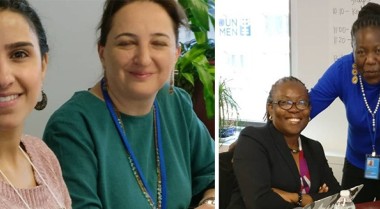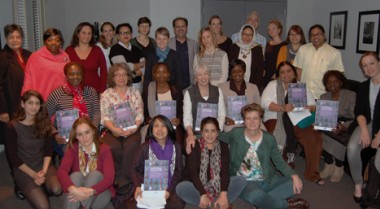
Redesign the Table for Sustainable Peace & Security
GPPAC gender experts gathered in New York from the 26th to 31st October, to mark years of work Shifting the Power to women peacebuilders preventing conflict at the local and regional level. They united to continue their efforts to Redesign the Table of the UN Security Council to meaningfully include women in all their diversity in peace and security decision-making as their participation still remains very limited. Particularly women peacebuilders mediating conflicts at the grassroots level remain without recognition.
A number of our gender experts participated in the annual Women, Peace and Security (WPS) Week, a time dedicated to taking stock on how far the women, peace and security agenda has come, what challenges remain and the way forward. They brought with them expertise from their daily work and key recommendations on how to support efforts of women peacebuilders on the ground to New York-based policymakers.
Our gender experts stand for numerous fearless and determined women from the GPPAC network who work towards building sustainable peace.
In October 2000, UNSCR 1325 was adopted. It was the landmark resolution that drew international attention to women in peace and security issues. The resolution addresses two major points: Women are disproportionately affected by armed conflict and women play a crucial role in conflict prevention. At GPPAC, we advocate for the full implementation of UNSCR 1325. We are convinced that women’s participation must be at the heart of all efforts to prevent conflict and build sustainable peace. Today, the Women, Peace and Security agenda has grown substantially, comprised of 10 resolutions which affirm the Security Council’s responsibility and commitment to strengthening women’s participation and protection in conflict settings. The most recent Resolution 2493 (2019) was adopted unanimously under the presidency of South Africa.
We are convinced that women’s participation must be at the heart of all efforts to prevent conflict and build sustainable peace.
UNSCR 2493 strengthens the existing normative framework of Women, Peace and Security by putting an accent on the role of regional and sub-regional organisations and its strong focus on the implementation of previous commitments.
During the negotiation of Resolution 2493, the role of civil society and women human rights defenders, as well as sexual and reproductive health and rights, emerged as the most controversial topics. These three issues had already pointed to the polarised positions in the Security Council during its annual open debate on Sexual Violence in Conflict when Resolution 2467 (2019) was adopted under the presidency of Germany. Russia and China abstained which shows that it is becoming harder to establish political consensus in the Security Council for the full implementation of Women, Peace and Security commitments. However, during the debate in October, the role of civil society and women human rights defenders and sexual and reproductive health and rights received strong support in statements by the UK, France, Belgium, Germany, the Dominican Republic, Norway, Mexico, Panama and Lebanon, to name a few.
Women and girls drive conflict prevention on the ground. Every day, women build sustainable peace in their communities as educators, community mediators and advocates. Their inclusion in peacebuilding processes is, therefore, a prerequisite for long-term success. However, women and especially young women remain excluded from peace processes. They are shut out of decision-making processes that determine their future. The gap between committing to the WPS agenda and supporting its full implementation remains. One of the most persistent obstacles to the full implementation of the WPS commitments, especially in conflict prevention is a lack of allocated resources.
Every day, women build sustainable peace in their communities as educators, community mediators and advocates. Their inclusion in peacebuilding processes is, therefore, a prerequisite for long-term success.
Redesign the Table to gender-responsive prevention
To tackle the lack of funding the Women’s Peace and Humanitarian Fund (WPHF) hosted the Launch of the 365 Days of Action to discuss the need to invest in women peacebuilders and humanitarian responders. GPPAC’s Gender Liaison Sharon Bhagwan-Rolls who spoke on behalf of four civil society board members of the WPHF focused on enhancing global partnerships to achieve the goal of mobilizing ($40 million) in financing by the end of 2020 to enhance women’s participation, leadership and empowerment in settings of conflict and crises across the globe. She stressed that a shift from crisis reaction financing to gender-responsive peacebuilding and preventative action is only possible when we redesign the table to tackle power imbalances and shift the power to national and local women’s rights actors. This is not only about providing the space for meaningful participation but also to empower women in leading the transformative process.
Ensuring the Inclusion of Young Women in Conflict and Atrocity Prevention
When it comes to participation, we must move beyond the assumption that one woman speaks for all. Obstacles for young women peacebuilders to meaningfully participate must be removed. Instead of speaking on their behalf, their own voices must be heard. During our event ‘Ensuring the Inclusion of Young Women in Conflict and Atrocity Prevention’ which we co-hosted with the International Coalition for the Responsibility to Protect, The Dutch Gender Platform WO=MEN , the Friedrich Ebert Stiftung New York Office, the Permanent Mission of Germany to the United Nations and Cordaid, we discussed conflict prevention measures from an inter-generational gender-perspective. Our 26-year-old gender expert Sanaa Albanawi from Jordan stressed ‘as young women, we are doubly marginalized. For being a woman and being young.’ Our male panellist, Henk-Jan Brinkman, Chief Peacebuilding Strategy and Partnerships Branch UNDPPA, acknowledged more should be done on prevention. In addition, he recognised the importance of youth inclusion in making real change on the ground. Janina Hasse-Mohsine, First Secretary Political Department of the Permanent Mission of Germany to the United Nations encouraged civil society to engage with German embassies in their respective country as another avenue for engagements.
Obstacles for young women peacebuilders to meaningfully participate must be removed. Instead of speaking on their behalf, their own voices must be heard.
A growing community
Over the years, the WPS community has grown significantly. The number of member states committed to Women, Peace and Security is growing as is the number of those that have demonstrated their determination to support women from civil society. Never before have we had such an open and honest dialogue between representatives of member states, international organisations and women peacebuilders on implementing commitments to Women, Peace and Security and providing the necessary support to women that are preventing conflict on the ground.
Our gender experts participated in several multistakeholder engagements where they shared the impact of their local work as women peacebuilders in Cameroon, Jordan, Lebanon, Botswana, Fiji, Armenia, Nigeria, Sri Lanka and the Philippines. They highlighted the importance of conflict prevention, meaningful inclusion of all women, particularly young women and their participation in peace processes to name a few.
What echoes from our engagements in New York is the desire from partners, friends and allies to emphasise Women, Peace and Security not only during this designated week but throughout the year.
For us and our gender experts, WPS Week is every week. We unite in our shared commitment to Redesign the Table and Shifting the Power to women peacebuilders preventing conflict at the local and regional level.
As 2020 marks a bold milestone for Women, Peace and Security, we need to stand together to bridge the gap which prevents implementing commitments to Women, Peace and Security at local, national and regional levels in order to support women’s efforts to prevent conflict.

